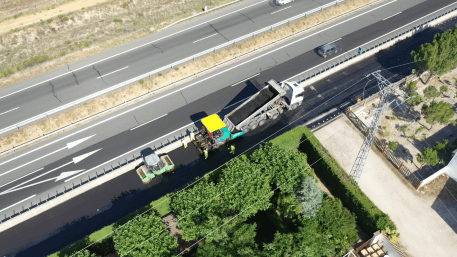Sacyr Concesiones has used Bioroad, an additive developed by UNICO GREEN, to pave two sections of the Autovia del Eresma road, A-601, in Segovia. Bioroad is a liquid additive that allows to produce semi-hot asphalt mixes.
Bioroad also provides longer durability to asphalt mixtures and improves production, application, and compaction processes, with no production cost increase.
What differentiates this additive from others able to lower the production temperatures is that Bioroad is ecofriendly, because the formulation includes 30-50% of recycled vegetable oils, and 20-30% of olive oil byproducts, such as alpechin. Functionality of these byproducts is achieved thanks to graphene nanotechnology.
Bioroad allows to produce semi-hot asphalt mixtures at 120-140 ºC, which is around 40 ºC less the usual production temperature. Producing at a lower temperature translates into reduced energy consumption rates and a lower carbon footprint. Moreover, it is safer for workers to handle the substance on application.
At the appropriate dose, Bioroad allows to produce durable asphalt mixture, that is, mixtures that can be stored in bulk and applied after long periods of time in storage.
Moreover, there are other Bioroad ranges that can be mixed to produce 100% recycled asphalt. “This action on Autovia del Eresma allowed us to confirm that Bioroad can reduce production temperatures in our mixtures by 40ºC, working on the range of semi-hot mixtures and that it is in fact possible to correctly apply and compact said mixtures, resulting in more durable mixtures”, explained Carlos Rodriguez, Highways director for Sacyr Concesiones Spain.
The Autovia del Eresma sections where Bioroad has been applied were the “Carbonero Norte” (E-85) link exit road going to Segovia to the Carbonero El Mayor municipality and at the service road to the rightmost edge between the road to Cuellar and the “Villa y Tierra de Cuellar” link (E-57).
